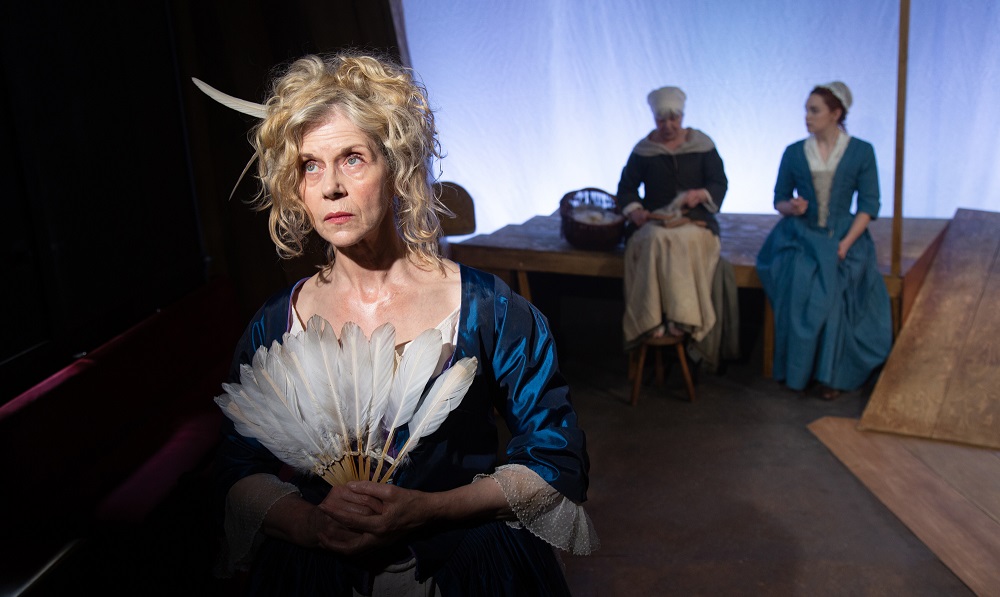
Review: The Straw Chair, Finborough Theatre
Review: The Straw Chair, Finborough Theatre
“There is considerable beauty in this simply staged show, where sensitive lighting and sound effects successfully convey atmosphere.” Jenny Booth reviews.
There was once a Lord Advocate of Scotland who grew tired of his termagant wife: her loudness, her shameless sensuality, her fits of rage and depression, her drunken declarations of undying love, and her inconvenient ability to sniff out his secrets. So he set her aside; and when she wouldn’t go quietly, he had his friends abduct her, and beat her, and incarcerate her on a remote and primitive island beyond the Outer Hebrides. This tale of male repression is the premise for a gem of a play, tender and beautiful and wild by turns. The action opens in 1740 as a newly wed minister and his timid teenage wife arrive to spend the summer on the St Kilda archipelago as Christian missionaries to the population of Gaelic-speaking fisherfolk. Dutiful Isabelle (Rori Hawthorn) is confronted by a haughty, bedraggled madwoman who seizes back possession of the straw chair, a battered symbol of a former life. Isabelle’s curiosity and sympathies are engaged, but her husband Aneas (Finlay Bain) bans her from speaking to the mad Lady Rachel Grange, convinced she must have deserved her mistreatment. Isabelle’s obedience, and her husband’s instinctive deference to more powerful men, are themselves types of emotional repression. The theme is sensitively explored by director Polly Creed, who contrasts the social rules and anxieties of city people with the simple directness of the St Kilda folk.
“Miss Havisham meets King Lear” was the verdict of one opening-night critic on Lady Grange, thus deftly nailing the character’s haughty and obsessive side, her ability to wound by telling piercing truths, and her pitiful disarray amid overwhelming misfortune. However, the description misses out the bawdiness and humour that make the audience warm to her, and the feral, fox-like craftiness and cruelty that repel us. Playwright Sue Glover breathes life into the scary mad woman in the attic. “An hysteric, an exhibitionist – and, sadly, her own worst enemy. But she was also a fighter,” writes Glover affectionately. Only an actress as experienced as Siobhan Redmond could bring off a character so complex, showing the variety in her moods and compelling the audience to sympathise with and dislike her at the same time. Redmond gives a virtuoso performance that shouldn’t be missed.
There is considerable beauty in this simply staged show, where sensitive lighting and sound effects successfully convey atmosphere. Hawthorn and Bain tenderly unfold the tentative passion of a couple falling in love after marriage. Hawthorn’s Isabelle blossoms. Jenny Lee plays Lady Grange’s St Kildan attendant Oona with stoicism and dignity, and makes us vividly imagine life on the unforgiving landscapes of Hirta and Bororay. As musical director, Hawthorn has chosen haunting Gaelic folk tunes: and she sings as the show’s closing number the transcendent Chuir lad Mise dh’Eilean Leam Fhin (They sent me alone to an island), which was handed down in the oral tradition from one of the last actual inhabitants of St Kilda before the whole population was evacuated in 1930. The core of the story is true: there really was a Lady Grange who was kidnapped and prevented from communicating with her relatives. She finally had a letter smuggled to her cousin, a solicitor, who sent a sloop to save her – but her captors had already moved her on.
Finborough Theatre, until 14 May
Image: Carla Joy Evans







